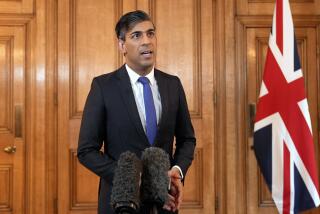Two militants reported killed in U.S. drone attack in Somalia
JOHANNESBURG, South Africa -- Two leaders of the Al Qaeda-linked Somali militant group Shabab, including the coordinator of its suicide attacks, were killed Monday in a drone attack, according to witnesses and a spokesman for the fighters.
A senior U.S. military official told the Associated Press that the United States carried out a strike in Somalia on Monday but did not confirm details of the attack.
A Shabab spokesman, Abu Mohamed, was quoted by the Associated Press as saying that one of the dead was Ibrahim Ali Abdi, also known as Anta, an explosives expert and coordinator of suicide bombings. An unnamed militant also died in the attack.
A witness, Hassan Nur, told Reuters news service that he saw a drone attack a Suzuki vehicle near Jilib, in an area controlled by the Shabab about 75 miles north of the port of Kismayo.
âI heard a big crash and saw a drone disappearing far into the sky. At least two militants died,â Nur said. âI witnessed a Suzuki car burning.
âMany Al Shabab men came to the scene,â he said. âI could see them carry the remains of two corpses. It was a heavy missile that the drone dropped. Many cars were driving ahead of me but the drone targeted this Suzuki.â
The attack reportedly occurred as Shabab leaders were driving to intervene in a clan dispute.
A Twitter account purporting to speak for the Shabab claimed that a man, a woman and four children were killed in the drone attack. The Twitter accountâs claim to speak for the Shabab could not be verified. Numerous Twitter accounts representing the Shabab have been closed in recent months, only to be replaced by more with similar names.
The Shabab claimed responsibility for last monthâs terrorist attack on a Kenya shopping mall, which killed 61 civilians and six Kenyan security force members.
U.S. Navy SEALs launched a predawn ground attack in the Shabab stronghold of Baraawe this month in an effort to kill Abdulkadir Mohamed Abdulkadir, a senior Shabab figure better known as Ikrima, but were driven back by Shabab fighters and unable to confirm whether they had killed their target.
The Shabab has faced territorial losses and serious internal divisions in recent years, but analysts warn that the group remains nimble and dangerous. The two U.S. strikes in Somalia this month reflect the seriousness with which U.S. officials view the Shabab threat.
Abdulkadir spent time in Norway and Britain and is believed to have planned numerous terrorist attacks in Kenya, according to a Kenyan intelligence report.
Shabab leader Ahmed Abdi Godane is on the U.S. list of most-wanted terrorists, with a $7-million bounty on his head.
Godane is rarely photographed, videotaped or seen in public, perhaps because of the threat of drone strikes. Some of the reports on the Baraawe attack initially suggested Godane may have been the target.
He is also seen as aligning the Shabab more closely with Al Qaeda and with embracing a more global anti-Western agenda, rather than the battle for control of Somalia that preoccupied some of his past rivals. Godaneâs forces have killed some of those rivals; others have defected to the government.
The Shabab has threatened more attacks on Kenya and other African countries with troops in Somalia, including Uganda and Burundi.
ALSO:
Spain calls in U.S. ambassador to complain of spying
Egypt: Attack in Nile Delta leaves three police officers dead
L.A.-bound man carrying bomb parts detained at Montreal airport
Twitter: @latimesdixon
More to Read
Sign up for Essential California
The most important California stories and recommendations in your inbox every morning.
You may occasionally receive promotional content from the Los Angeles Times.









